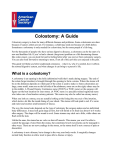Download INTiMAcy AFTER OSTOMy SURGERy GUidE
Transcript
*OUJNBDZ"GUFS0TUPNZ 4VSHFSZ(VJEF "QVCMJDBUJPOPGUIF6OJUFE0TUPNZ"TTPDJBUJPOTPG"NFSJDB*OD i4FJ[FUIF 0QQPSUVOJUZw INTIMACY AFTER OSTOMY SURGERY Revised 2009 Gwen Turnbull, BS, RN, ET, Clearwater, Florida This guidebook is available for free, in electronic form, from the United Ostomy Associations of America (UOAA). It was originally produced, copyrighted and sold by the United Ostomy Association (UOA), the national US ostomy organization from 1962 to 2005, which released its copyrights on this material. UOAA may be contacted at: www.ostomy.org • [email protected] • 800-826-0826 CONTENTS I SEX AND STOMAS: MYTHS AND TRUTH 4 II HOW OUR BODIES WORK DURING SEX 8 III COMMON SEXUAL PROBLEMS 13 IV TALKING WITH YOUR SEXUAL PARTNER 14 V THE EFFECT OF MEDICINES ON SEX 15 VI PEARLS FOR THE BEDROOM 16 VII CONTROLLING GAS AND ODOR 17 VIII HELPFUL HINTS Alternative Lifestyles Spinal Cord Injury, Sex and Ostomy Birth Control for Men and Women When You Should Get Professional Help Help for Impotence 18 IX RESOURCES 20 X GLOSSARY 21 3 Despite our differences and regardless of race, creed, or culture, every person on this planet has one thing is common. We are sexual beings —whether we are young or old, beautiful or plain, male or female, gay or straight, single or married, tall or short, black, white, yellow, religious or not, sexually active or not, or whether we have a stoma. Not only can sex continue to be or actually begin to be fun and pleasurable, but it's important to our overall emotional and physical sense of feeling OK. Sexuality makes us feel whole and normal, desirable and loveable. What can happen, however, is that everything associated with an ostomy can prevent people with an ostomy (as well as their sexual partners) from relaxing and enjoying the experience of sex. This can create added anxiety in the bedroom. Ostomy surgery may alter your sexual functioning but it won’t take away or destroy your sexuality. Many sexual problems experienced after ostomy surgery may be more emotional than physical and are often based on misinformation. Here are a few: Myth Fact And they lived happily ever after. This is a fairy tale. Relationships are like tides; sometimes they’re up and sometimes they’re down. Adjustments can be made to keep the joy of sex alive, but sex alone doesn’t make a relationship secure. Penis-in-vagina is the only sex worth having. Giving and receiving pleasure can be expressed in many ways; hugging, kissing, cuddling, holding hands, masturbation, oral sex, stimulation with the hands, and even sleeping in the same bed 4 My partner should know what pleases me. I shouldn’t have to explain it. Unless your partner has ESP, he or she can’t read your mind. Tell your partner what you like, what you don’t like. Women with a stoma can’t get pregnant. Women with a stoma can and do get pregnant and have healthy babies. It is important, however, for the woman to be followed by healthcare professionals throughout the pregnancy. No one will ever love me because I have a stoma. It’s reasonable to feel this way. People who’ve lost a breast to cancer or lost a limb feel this way too. Your attitude and how you treat yourself sets the tone on how others treat you. If you feel comfortable and accepting of your ‘new’ body, your partner is likely to do the same. I’ll never have an erection again. If there’s no erection the first time you try after surgery, don’t convince yourself this is the way it’s going to be. Rest. Relax. Regain your strength and try again. If the problem persists, talk to your doctor. A man must ejaculate to have an orgasm. Men can have an orgasm without ejaculating (a dry orgasm). Having sex will spread my cancer to my partner. Cancer isn’t spread through sexual contact. However, ‘safe sex’ should be used to prevent sexually transmitted diseases such as AIDS, HPV (human papilloma virus), and genital herpes. 5 The odor from my stoma will be a turn-off for my partner. Deodorizers especially designed for use with an ostomy are available to help reduce odors from stool and urine. Some are used in the pouch and some are taken by mouth. Modern pouches are made of odorfree materials. To remain fresh, keep your body and pouching system clean. Body movements and pressure of our bodies during sex will hurt my stoma. Close body contact and movement during sex won’t hurt your stoma. However, nothing (fingers, objects) should be put into the stoma. A stoma is not a sexual organ. Old people don’t have sex. Ha! Many seniors, including ones with an ostomy, are sexually active. Be sure to seek credible sources of information: your doctor, your WOC Nurse (Wound Ostomy Continence Nurse) or ET Nurse (Enterostomal Therapy), the UOAA, and other recognized authorities on the Internet. The Ladder of Life Needs Our need for and feelings about sex change as we move through life. We spend our existence climbing up and down our personal Ladders of Life Needs. In order for us to want sex, we must have basic needs, such as food, water, and shelter, satisfied. Once we have those things, we think about safety and our 6 health. When we're sure we’re safe and healthy, we then turn to love, affection, and sex which are linked closely to our feelings about ourselves. When all those pieces of the puzzle have been satisfied we feel free and secure enough to return to work, hobbies, and a social life. The journey up and down the Ladder of Life Needs is quite evident as you recover from ostomy surgery. When you're healthy, your desire for sex holds a certain level of importance because your other needs are fulfilled. When illness or medical treatments interrupt, your life sex may not be so important so you go down a rung or two for a while. But as you recover, your desire to return to a normal lifestyle, sexual intimacy, and your need to regain your feelings of sexuality move up a few rungs. Work, hobbies, social life Self-respect, self-esteem Love, Affection, Sex Safety, Health Food, water, shelter 7 Sex isn’t so much about what happens between your legs. . . It’s more about what happens between your ears. . . Linked closely to our feelings of sexuality, however, is how we think (that's the "between the ears" part) about ourselves and our bodies - something the professionals call body image. It’s how we see ourselves in the mirror and think our body works, looks, smells, and appears to others. That's why, when something as dramatic as ostomy surgery changes our body image, our feelings of sexuality and self-esteem sometime feel threatened, even though we're still the same person (and often healthier) than we were before the operation. Let's face it, even without an ostomy, developing a satisfactory sex life isn't always easy. Everyone experiences sexual difficulties at some time during his or her life, whether the issues are emotional or physical. After ostomy surgery, there are some physical and emotional changes that can have a direct affect on sexual functioning. The best way to understand how these after-ostomy surgery changes might sway your ability and desire to participate sexually is to first understand how your cycle of sexual response worked before surgery. How Our Bodies Work During Sex 8 Sexual response consists of three phases: • sexual desire • sexual arousal • org as m The phases of response are the same whether you are stimulated by a partner or by yourself during masturbation. Various hormones and two different sets of nerves control the way our bodies respond during sexual activity. One set of nerves controls the "between the ears" part of sex by allowing us to feel these emotions, sensations and changes. The other set controls "the between the legs" part -- our body's ability to actually have the physical changes by controlling the flow of blood to the penis and vagina and activating the muscles in our sex organs, or genitals. Sexual desire is exactly what it says — the yearning and wanting to have sex — being "turned on" or "horny" — the restless feeling or emotional tickle we get. This desire to enter into sexual activity can be triggered (or blocked) by many things: our senses, (sight and smell, for example) and emotions (our thoughts and fantasies), but also our hormones (the male hormone testosterone and the female hormone estrogen). Testosterone is produced in the testicles and estrogen is produced in the ovaries. Adequate levels of these hormones are needed for sexual functioning. After you feel desire, your body enters into the second phase, called sexual arousal. You feel excited, passionate, and stimulated. Your heart rate and breathing speed up. Muscles in the body and sex organs become tense. Blood rushes to sensitive areas on your skin and sex organs. Men experience an erection of the penis and women’s vaginas expand and get moist. Orgasm is also a complicated physical and sensory experience made up of pleasant sensations and muscle contractions in the sex organs. Clinically speaking, an orgasm is simply the sudden release of pooled blood in the sex organs and tension in the muscles — much as sneezing releases the pent-up 9 pressure you feel before you sneeze. You could say that an orgasm is a "sneeze" in the sex organs! No two people experience orgasm the same way. The "sex between the ears" nerves control the pleasant sensation felt during orgasm. During orgasm, muscle contractions in men propel semen through the opening in the penis, and women experience rhythmic muscle contractions in the vagina. The " sex between the legs " nerves control this part of orgasm. Is it my body? Or is it my head? Although ostomy surgery and the diseases and conditions that caused you to have the operation may leave you temporarily weak or with a reduced sex drive (the medical term for sex drive is libido, pronounced la-bead-oh) , having an ostomy doesn't mean you have to ignore your sexuality. How we feel affects what we are able to do. After surgery, it's often hard to get back into feeling "sexy" again. Indeed, you might not have any sexual feelings for days, weeks, or even months. But don't worry, this is normal. How can you think about sex if you're still in pain or physically exhausted? Let your body recover and learn to manage your stoma before tackling intimacies in the bedroom. Some people start thinking about sex immediately after surgery. They may have been unable to participate sexually due to weakness or illness for quite a long time before surgery and are raring to go afterwards. Once again, these folks sometimes are disappointed the first time they attempt to have sex because their bodies haven't had enough time to recover. 10 The first time you become intimate after surgery things don't always go perfectly. Men may have trouble getting and keeping an erection and women sometimes have pain during intercourse. It's easy to get upset and convince yourself the surgery has ruined your sex life forever. But take a minute and think about it. It is really something caused by the surgery? Or is it your own worry and fear about your ability to perform? Are you worried that the stoma or the pouching system will offend your partner? Are you worried about leakage, the pouch falling off, or odor? Are you depressed? Do you feel unattractive? Are you taking medications that interfere with your sexual response? Or, are you simply not physically strong enough yet? It's easy to blame the ostomy for these feelings and problems. It's time to sort through these things and decide if they are really from your surgery and illness or "ancient history" — the sexual "baggage" you are carrying around with you. Be honest with yourself and take some time to think about it and discuss things with your partner. Seek professional help from a counselor, your physician, or a sex therapist. Talking really helps. Common Reactions to Ostomy Surgery That May Interfere with the Ability to Share Sex • • • • • Embarrassment Shame Fear of pain, leakage, rejection, being naked Anger Depression 11 Physical Changes Caused by Ostomy Surgery Because ostomy surgery takes place in the pelvis and parts or all of some of the organs there are removed, it makes sense that sexual functioning afterwards could be affected. However, the changes that can occur in men are quite different than those that can occur in women. Also, the type of ostomy operation you've had (ileostomy, colostomy, urostomy) and the reason you've had it (for example: cancer of the rectum versus Crohn's Disease) play a role in what physical changes have been made and the specific affect it will have on your sexual response. For example, a man who's had an abdominoperineal resection for cancer of the rectum may have difficulty getting or keeping an erection after surgery. Because the man had cancer, the surgeon had to remove a bigger portion of tissue around the rectum to prevent the possible spread of the cancer to healthy tissues. This removal of a wider piece of tissue often damages the nerves and blood vessels that control the ability to have an erection. This condition is called impotence or erectile dysfunction (ED). On the other hand, a man who has had his rectum removed for ulcerative colitis or Crohn's Disease may not have trouble with erections after surgery because his disease didn't require a wide removal of tissue around the rectum. Therefore, the nerves and blood vessels to the penis were not damaged. Before having any kind of ostomy surgery, it's important to discuss the possibility of changes to your sexual functioning you might expect after surgery. Ask your doctor, or WOC/ET Nurse. 12 Common Sexual Problems After Ostomy Surgery MEN Decrease in desire Surgery (may also be affected by pain, radiation, chemotherapy, & medications) Problems No orgasm with erection Dry orgasm Less orgasm Infertility (cannot produce sperm) (may also be affected by age and certain medications) (may also be affected by certain medications) Removal of the rectum Removal of the bladder Seldom Often Seldom Often Sometimes Sometimes Seldom Often Seldom Always Sometimes Always Pelvic exenteration Seldom Often Seldom Always Sometimes Always (removal of the bladder, rectum, colon) WOMEN Decrease in desire Painful intercourse (may also be affected by pain, radiation, chemotherapy, & medications) (can also be caused by vaginal dryness or a different position of the vagina after surgery) Removal of Seldom Sometimes Removal of Seldom Sometimes Surgery the rectum the bladder Pelvic exenteration Problems having an orgasm Less vaginal wetness Infertility (can also be caused by menopause, hysterectomy, or low estrogen) (inability to produce eggs or carry a child; ovaries. vagina, or uterus removed) Seldom Often Seldom Sometimes Seldom Often Sometimes Sometimes Sometimes Always Always (bladder, rectum, ovaries. uterus, colon, and sometimes all or part of the vagina are removed) Common Sexual Problems Related to Chemotherapy and Radiation • • Pregnancy is not recommended during chemotherapy. Chemotherapy and radiation may reduce the ovaries’ capacity to produce ripe eggs in women. o Women undergoing chemotherapy, radiation therapy or removal of the ovaries may want to preserve healthy eggs prior to surgery and these treatments if a future pregnancy is desired. 13 • • • These therapies may damage sperm cell production in men. Women may experience vaginal dryness. Men undergoing chemotherapy, removal of the rectum for cancer, or radiation therapy may want to preserve healthy sperm prior to surgery and these treatments if fathering a child is planned or desired. Talking with Your Sexual Partner One of the most important things you can do to strengthen your intimate relationship is to talk to your sexual partner. Face it. It’s tough to have sexual intimacies without exposing the stoma or the pouch. However, when you’re in the midst of passion and heat, it’s probably not the best time to teach your partner about an ostomy. We now have communication systems that allow someone on earth to talk to someone in space or on the moon, but we often cannot talk to the ones we love about what we feel, what is in our heart, and what we want and need. Most people are totally unfamiliar with ostomy surgery and have no idea what a stoma looks like, how it's connected to the abdomen, how and when you empty your pouch, or how it has or has not affected your ability to have sex. If you find someone (or are already in a relationship) with whom a sexual relationship is desired, you'll need to decide how and when you want to tell, and how much you want to share. Research has indicated that partners of people with an ostomy worry about all these things too. A lack of correct information can increase these worries and inhibit sex, so it's to your advantage to teach your partner. If the partner is worried about hurting the stoma, don't misinterpret this as a rejection. An intimate relationship is one in which it matters how well you can communicate about two of the most personal of human functions — body elimination and sex. Your partner will take the cue from you. Don't forget, though, that your partner's feelings are real and shouldn't be denied any more than your own. 14 • • • • • • • Things to Talk About Physical limitations (vagina dryness, problems with erections) Pain, if present Fears (of being unlovable, naked, leakage, odor, rejection) Your mutual expectations What sexual activities you like to do What sexual activities you do not like to do Anger, resentment, guilt or other emotions that interfere with the desire to share sex The more you can share information, the less difficult it will be to share your body. For example, if a woman is worried about painful intercourse after her surgery, she may prefer manual stimulation to orgasm by her partner. This can relieve a lot of tension and frustration, at the same time it serves as a "bridge" to the time she is ready for intercourse. However, the partner won't know this unless the woman talks about it. Since your attitude is probably the most important ingredient for a happy sex life, you should do whatever you feel you need to do to feel relaxed, free, and at ease with your body. Talking about these issues is a giant step forward. The Effect of Medication on Sex Americans take a lot of medicine. Seniors take more medicine than younger people and women take more than men. In fact, the average older person takes 4.5 prescription medicines and 2.1 non-prescription medications (such as, vitamins, over-the-counter cold medicine and other drugs, herbals, supplements). If you’ve had ostomy surgery, have a chronic illness or are receiving treatments for other conditions you’ll likely be taking one or more medications. If your surgery was fairly recent, your body still hasn't fully recovered from the affects of anesthesia and you may still be taking some pain medicine. Sometimes combining prescription and non-prescription medicines together can cause some unexpected side effects in the place you least expect it — the bedroom. The following is a list of some common types of medications that can interfere with sexual desire, erection, and sexual functioning. It's a good idea to discuss your medications with your doctor or pharmacist to check for any sexrelated side effects. For example, a man might be taking an antidepressant after surgery to help him cope with his emotional reaction to the surgery. His problem with erection may be only a temporary one caused by the antidepressant rather than the operation. Common Sexual Side Effects of Medicines • Reduced desire 15 • Difficulty with ejaculation • Difficulty getting and/or keeping an erection • Decrease in the strength of orgasm Some Medications That May Affect Sexual Functioning • • • • • • • High blood pressure medicine Antid ep ressants P a in m ed i cin e Alcohol Tra nq uiliz e rs Antihistam ines Sleep ing p ills Pearls for the Bedroom Most people do certain things to get ready for sex. Mostly, things that make them feel sexy -- whether it's showering, shaving, slathering on the after shave or perfume, or wearing something skimpy. For others, it’s soft lights, champagne, candlelit dinners, and romantic music. Sometimes people with a stoma feel they need to do a little more. The following are a few ‘pearls’ that may help you feel more comfortable in the bedroom. • • • • • • • • • Always practice SAFE SEX (foams, lubricated condoms, other forms of contraception) Focus on your feelings, not the pouch. Empty the pouch before engaging in s exual activity. Make sure the pouch is secure; reinforce it with paper tape around the edges. If you wear an ostomy pouch belt, make sure it's clean Make sure you are clean — better yet, jump in the tub or shower together. If you’re concerned about the appearance of the pouch use a pouch cover or a pouch you can't see through Use a “passion pouch” during sex. These are smaller, closed-end, disposable pouches that are shorter and less bulky than standard drainable pouches. There are many brands available. The “side-lying” position may work better on the stoma side because the 16 • pouch will fall away and not come between you and your partner. If you have a colostomy and you irrigate, irrigating just before you have sex might allow you to wear a small patch or ''security pouch" during that time. Controlling Gas and Odor • • Gas • Many over-the-counter medications, such as Mylanta Gas® (Johnson & Johnson — Merck Consumer Pharmaceuticals Co., Ft. Washington, Pa.) and Phazyme® (Glaxo SmithKline, Philadelphia, Pa.), are effective in reducing gas. • Dietary supplements, such as Beano® (Glaxo SmithKline, Philadelphia, Pa.), are also quite effective in reducing gas related to the breakdown of complex sugars in gas-causing foods and are available as tablets or drops. • Avoid "gassy" foods such as cabbage, sodas, beer, beans, and chili if you know you’re going to be sexually active. • If you have an ileostomy or a colostomy, gas filters are available in both drainable and closed-end pouches. These help to keep the pouch flat and deodorize gas. Odor • If you have a urostomy, avoid foods that cause strong odor in the urine, such as asparagus. • Bismuth subgallate, charcoal, or chlorophyllin copper complex are effective in managing odor. Check with your doctor, or WOC/ET Nurse before taking or using any of these products • Bismuth subgallate tablets have been used as oral deodorizers for years. They do darken and thicken stool and have side effects with long-term use that cease when the drug is discontinued. They can also be used in the pouch. (Example: Devrom®, Parthenon • Activated charcoal has been used orally to reduce fecal odor but can darken the stool and cause constipation. However, there doesn’t seem to be any reduction in odor with oral doses of charcoal for patients with a colostomy. Many closed-end and drainable pouches have built-in charcoal filters to deodorize gas in the pouch and help prevent the pouch from ‘ballooning.’ • Chlorophyllin has been proven to control body and fecal odor and is safe in oral doses up to 100 mg three times a day. It can turn the stool green and cause diarrhea. It can also be used in the pouch. • Specially formulated deodorizers can be put directly into the pouch. NOTE: Never use an aspirin tablet in your pouch as a deodorizer. Aspirin can irritate the stoma. • If you have an ileostomy or a colostomy, gas filters are available in both drainable and closed-end pouches. These help to keep the pouch flat and deodorize gas. • Use a room freshener after emptying your pouch (example: Ozium Air Sanitizer® (Atmosphere Products Co., Inc.) 17 Hints for Women: • Use personal lubricants for vaginal dryness (for example Astroglide®, K-Y Jelly): you can buy these in most grocery or drug stores. • Hormone creams or vaginal suppositories are sometimes prescribed for vaginal dryness. Talk to your doctor about them. • Consider wearing crotch-less panties, ''teddies," or a short slip or nightie, or something with a snap- or cut-out crotch. • If the pouch or other stoma covering seems to be in the way or causes pain during intercourse, experiment with different positions. • You might not come to orgasm the first time you have sex after surgery. Don't worry, this is normal. Hints for Men: • • In the “man on top” position, lean a little toward the pouchfree side of your tummy. Consider wearing a cummerbund around your midsection to prevent the pouch from flapping. • Try wearing some attractive boxer shorts if you’re concerned about exposing the pouch. • Continued problems, such as the inability to get or maintain an erection should be discussed with appropriate health care professionals. There are solutions to almost every sexual problem, so don’t panic! Alternative Lifestyles: Ostomy surgery affects all kinds of people, homosexuals and heterosexuals. Removal of the rectum and closing of the anus may present a sexual impairment for some people with an ileostomy or colostomy, so other methods of sexual pleasuring need to be discussed and investigated. Gays have the same concerns and fears about sex after ostomy surgery as heterosexuals. Many gay men and lesbians are often worried about real or imagined prejudice about their lifestyle and therefore don’t tell health professionals and caregivers. This limits the ability of these people to assist to help them live more positively after ostomy surgery. There are ostomy support groups available for lesbian and gay ostomates. Spinal Cord Injury, Sex, and Ostomy It is common for people who have spinal cord injuries to have a stoma — sometimes two stomas. Ostomy surgery restores control over the bladder and rectum that was lost when the spine was injured. These individuals may be 18 wheelchair or bed bound, so sexual activity has additional limitations not experienced in other people. Spinal cord injured or wheelchair bound people should discuss their ability to participate in sex as well as alternative methods of giving and receiving sexual pleasure. "Sex and the Witty" It’s true that ostomy surgery and sex are serious “business.” But perhaps that’s all the more reason to keep and develop a sense of humor about it. Joy, humor and laughter are wonderful, easily available, low-cost tools for bringing comfort into a relationship. "Laughter is the shortest distance between two people" Victor Borge An ostomy should not be viewed as the end to living, but simply living with a new end in view! Embarrassing situations are often eased by a quick sense of humor. Untimely noises from a stoma can be a straight line for many funny comebacks. Come on, isn't "bathroom humor" the kind of humor that makes everyone laugh? Take advantage of it. Birth Control for Men and Women Women: Birth control methods should be discussed before and after ostomy surgery if this is of concern to you. A woman with an ostomy who uses birth control pills needs to remember that this drug is usually absorbed in the small intestine. Therefore, if you have a urostomy, sigmoid or transverse colostomy, you should have no trouble absorbing birth control pills. However, there is a slight chance the pills may not be absorbed if you have an ileostomy — leaving you at risk of becoming pregnant. The use of diaphragms and IUDs (intrauterine devices) should also be discussed with healthcare professionals, especially in women who have had their rectums or part of the vaginal wall removed. Today, there are many options for women besides birth control pills: hormone skin patches, regular injections, etc. Discuss these issues with your doctor, gynecologist, or Ostomy Nurse, and pharmacist. Men: If your surgeon feels there is a chance you may become sterile after your ostomy surgery and you still want to be able to father a child, you may want to think about storing your sperm before your surgery. Discuss these options with your surgeon or other health professional. 19 When You Should Get Professional Help Problems with sex that last for several weeks or months shouldn’t be ignored. You’re not alone. There are many options available to you in solving them, whether the solutions involve sex therapy, couples therapy, talking to someone from a support group, surgical corrections, or the use of medical devices and medication. Ask for help if you have any of the following problems that don't go away: • • • Pain during intercourse that lasts for weeks and months after surgery Difficulty making sexual adjustments for you, your partner, or both of you Inability to talk about sex with your partner Help for Impotence Millions of men and their partners suffer with impotence. There are many reasons for it — physical changes, diseases such as diabetes and alcoholism, the aging process, or emotional difficulties, such as fear, stress, worry, anger, or frustration. Sometimes these physical and emotional problems can happen at the same time. For example, a slight physical problem with erections can get worse because the man is worrying about it all the time. The cause of the impotence will decide what the treatment should be. Hormone treatment, medications, drug injections into the penis, counseling, and penile prostheses (a surgically implanted device that enables a man to have an erection) are all possible treatment options. Talk with your doctor, or Ostomy Nurse. Don't worry in silence. Resources The United Ostomy Associations of America, Inc. • www.ostomy.org 800-826-0826 Health Care Professionals: • • • • • • • • • Colorectal surgeons WOC(ET) or Ostomy Nurses Urologists G ynecologists Urogynecologists Psychiatrists Psychologists Sex Educators, Counselors, and Therapists Fertility specialist UOAA Trained Ostomy Visitors 20 Helpful Web Sites: • American Association of Sexuality Educators, Counselors, and Therapists • National Institutes of Health, National Institute on Aging • www.w ocn.org will help locate a certified WOC Nurse near you Am erican Ca ncer Society • www.n ia. nih.gov click on "Health Information" for Sexuality in Later Life brochure Wound, Ostomy and Continence Nurses Society • www.aasect.org will help you find a professional near you www.ca ncer.org Crohn's and Colitis Foundation of America w ww .ccf a . or g Glossary of Terms Body image the way a person views how his or her body looks, smells, and appears to others Erectile dysfunction also called E.D. See impotence. Erection a penis that is hard or rigid enough for sexual activity Ejaculation release of sperm from the penis Hormones substances formed in certain glands in the body that enter the bloodstream and affect or control the activity of some organs. The so-called "sex hormones" are estrogen, the female hormone and testosterone, the male hormone. Adequate levels of sex hormones are needed for optimal sexual functioning. Impotence the inability to have an erection that is firm enough or lasts long e nough for succe ssful inte rcourse. Also called erectile dysfunction, or ED. Impotence is not the same thing as being sterile. Libido the urge or desire to have sex Masturbation self-stimulation of the sex organs 21 Orgasm the "climax' of intercourse or masturbation. A total body response at the height of sexual excitement. The sudden release of pooled blood in the sex organs and tension in the muscles. Sterility Male sterility is a lack of sperm or enough healthy sperm that makes it possible to make a woman pregnant. Female sterility means the absence of a uterus to carry a child, or the inability to become pregnant. 22











































